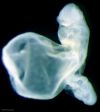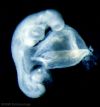Week 4
| Embryology - 4 Mar 2026 |
|---|
| Google Translate - select your language from the list shown below (this will open a new external page) |
|
العربية | català | 中文 | 中國傳統的 | français | Deutsche | עִברִית | हिंदी | bahasa Indonesia | italiano | 日本語 | 한국어 | မြန်မာ | Pilipino | Polskie | português | ਪੰਜਾਬੀ ਦੇ | Română | русский | Español | Swahili | Svensk | ไทย | Türkçe | اردو | ייִדיש | Tiếng Việt These external translations are automated and may not be accurate. (More? About Translations) |
Introduction
Key Events of Human Development during the fourth week (week 4) following fertilization or clinical gestational age GA week 6, based on last menstrual period.
These notes cover the fourth week of embryonic development, which is the beginning of organogenesis, (specific tissues and systems are beginning to differentiate) from the trilaminar embryo.
On the embryo surface sensory placodes and limb buds appear. Sensory placodes (otic, lens, nasal) will form specific components of the ear, eye and nose. Limb buds form from ectoderm and mesoderm (somite) components and are the "paddle-like" projections from the trunk which will form all the upper and lower limb components.
Within the embryo, this period of organogensis is usually extended to cover until 8 weeks of development. Folding of the embryo continues and the earliest functioning organ is the heart. Other systems such as the circulatory, digestive, urogenital and nervous system begin to all take shape.
As systems are beginning to develop, each page in this section is only a brief summary with additional links to specific notes covering these systems/tissues. Note that most tissue development during week 4 will also be covered in the system development notes.
| Week 4 Links: stage 10 | stage 11 | stage 12 | 13 | Placodes | Pharyngeal arches | Lecture - Mesoderm | Lecture - Ectoderm | Lecture - Early Vascular | Category:Week 4 | GA week 6 |
Carnegie Stages
| Week: | 1 | 2 | 3 | 4 | 5 | 6 | 7 | 8 |
| Carnegie stage: | 1 2 3 4 | 5 6 | 7 8 9 | 10 11 12 13 | 14 15 | 16 17 | 18 19 | 20 21 22 23 |
Historic Carnegie Stages 10 to 13.
Timeline
| Week 4 - Human Embryo Stages and Events (GA week 6) | ||
|---|---|---|
| Embryo Week: Week 1 | Week 2 | Week 3 | Week 4 | Week 5 | Week 6 | Week 7 | Week 8 | Week 9 | ||
| Event | ||
| Stage 10 | 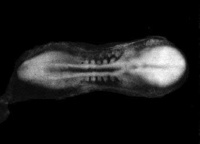 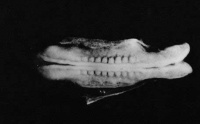
neural crest - differentiation at spinal cord level from day 22 until day 26 neural - neural folds begin to fuse near the junction between brain and spinal cord, when neural crest - cells are arising mainly from the neural ectoderm neural crest - trigeminal, facial, and postotic ganglia components visible[1] neural crest - migration of vagal level neural crest cells begins (7-10 somite stage) neural - Brain rostral neural tube forms 3 primary brain vesicles (week 4) respiratory - Week 4 laryngotracheal groove forms on floor foregut. | |
| heart - begins to beat in Humans by day 22-23, first functioning embryonic organ formed. | ||
| Stage 11 | 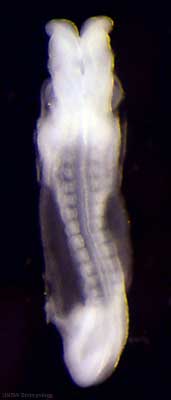
thyroid - thyroid median endodermal thickening in the floor of pharynx neural - rostral (or cephalic) neuropore closes within a few hours; closure is bidirectional, it takes place from the dorsal and terminal lips and may occur in two areas simultaneously. The two lips, however, behave differently. Optic ventricle appears | |
| Stage 12 | 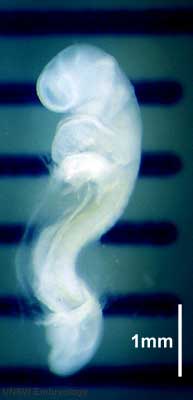
pituitary - Week 4 hypophysial pouch, Rathke's pouch, diverticulum from roof liver septum transversum forming liver stroma and hepatic diverticulum forming hepatic trabeculae[2] neural - caudal neuropore takes a day to close (closure is approximately at future somitic pair 31/sacral vertebra 2) neural - secondary neurulation begins neural crest - cardiac crest, neural crest from rhombomeres 6 and 7 that migrates to pharyngeal arch 3 and from there the truncus arteriosus[1] neural crest - vagal neural crest enter the foregut (20-25 somite stage) | |
| Stage 13 | 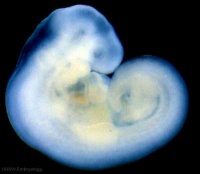 Neural - the neural tube is normally completely closed, ventricular system now separated from amniotic fluid. Neural crest at spinal level is segregating, and spinal ganglia are in series with the somites. Spinal cord ventral roots beginning to develop.[3] Neural - the neural tube is normally completely closed, ventricular system now separated from amniotic fluid. Neural crest at spinal level is segregating, and spinal ganglia are in series with the somites. Spinal cord ventral roots beginning to develop.[3]
telencephalon cavity appears liver epithelial cord proliferation enmeshing stromal capillaries[2] smell Crest comes from the nasal placodes[4] integumentary - 4 weeks simple ectoderm epithelium over mesenchyme integumentary - 1 to 3 months ectoderm - germinative (basal) cell repeated division of generates stratified epithelium; mesoderm - differentiates into connective tissue and blood vessels | |
| Note - the day timing of stages is only approximate, system names link to first page of that specific system, and events are based upon the literature cited below. | ||
References
| ||
| Event | ||
| Carnegie stage 10 |  
Neural Crest - differentiation at spinal cord level from day 22 until day 26 Neural - neural folds begin to fuse near the junction between brain and spinal cord, when Neural Crest - cells are arising mainly from the neural ectoderm Neural Crest - trigeminal, facial, and postotic ganglia components visible[1] Neural Crest - migration of vagal level neural crest cells begins (7-10 somite stage) Neural - Brain rostral neural tube forms 3 primary brain vesicles (week 4) Respire - Week 4 laryngotracheal groove forms on floor foregut. | |
| Heart - begins to beat in Humans by day 22-23, first functioning embryonic organ formed. | ||
| Stage 11 | 
Thyroid - thyroid median endodermal thickening in the floor of pharynx Neural - rostral (or cephalic) neuropore closes within a few hours; closure is bidirectional, it takes place from the dorsal and terminal lips and may occur in two areas simultaneously. The two lips, however, behave differently. Optic ventricle appears | |
| Stage 12 | 
Pituitary - Week 4 hypophysial pouch, Rathke's pouch, diverticulum from roof Liver Development septum transversum forming liver stroma and hepatic diverticulum forming hepatic trabeculae[2] Neural - caudal neuropore takes a day to close (closure is approximately at future somitic pair 31/sacral vertebra 2) Neural - secondary neurulation begins Neural Crest - cardiac crest, neural crest from rhombomeres 6 and 7 that migrates to pharyngeal arch 3 and from there the truncus arteriosus[1] Neural Crest - vagal neural crest enter the foregut (20-25 somite stage) | |
| Stage 13 |  Neural - the neural tube is normally completely closed, ventricular system now separated from amniotic fluid. Neural crest at spinal level is segregating, and spinal ganglia are in series with the somites. Spinal cord ventral roots beginning to develop.[3] Neural - the neural tube is normally completely closed, ventricular system now separated from amniotic fluid. Neural crest at spinal level is segregating, and spinal ganglia are in series with the somites. Spinal cord ventral roots beginning to develop.[3]
telencephalon cavity appears Liver Development epithelial cord proliferation enmeshing stromal capillaries[2] Sense - Smell Crest comes from the nasal plates[4] Skin - 4 weeks simple ectoderm epithelium over mesenchyme Skin - 1 to 3 months ectoderm - germinative (basal) cell repeated division of generates stratified epithelium; mesoderm - differentiates into connective tissue and blood vessels |
Week 4 Movies
Note that many of the movies start in week 4 and continue on through later embryonic development.
Neural
| Neural Plate | Neural Tube |
Mesoderm
| Mesoderm | Somite Structures | Vertebra |
Heart
| Heart Looping | Heart Realign | Heart Atrial Septation | Heart Outflow Septation |
References
- ↑ 1.0 1.1 O'Rahilly R & Müller F. (2007). The development of the neural crest in the human. J. Anat. , 211, 335-51. PMID: 17848161 DOI.
- ↑ 2.0 2.1 Godlewski G, Gaubert-Cristol R, Rouy S & Prudhomme M. (1997). Liver development in the rat and in man during the embryonic period (Carnegie stages 11-23). Microsc. Res. Tech. , 39, 314-27. PMID: 9407542 <314::AID-JEMT2>3.0.CO;2-H DOI.
- ↑ Müller F & O'Rahilly R. (1988). The development of the human brain from a closed neural tube at stage 13. Anat. Embryol. , 177, 203-24. PMID: 3354839
- ↑ Müller F & O'Rahilly R. (2004). Olfactory structures in staged human embryos. Cells Tissues Organs (Print) , 178, 93-116. PMID: 15604533 DOI.
Embryo Week: Week 1 | Week 2 | Week 3 | Week 4 | Week 5 | Week 6 | Week 7 | Week 8 | Week 9
- Carnegie Stages: 1 | 2 | 3 | 4 | 5 | 6 | 7 | 8 | 9 | 10 | 11 | 12 | 13 | 14 | 15 | 16 | 17 | 18 | 19 | 20 | 21 | 22 | 23 | About Stages | Timeline
Glossary Links
- Glossary: A | B | C | D | E | F | G | H | I | J | K | L | M | N | O | P | Q | R | S | T | U | V | W | X | Y | Z | Numbers | Symbols | Term Link
Cite this page: Hill, M.A. (2026, March 4) Embryology Week 4. Retrieved from https://embryology.med.unsw.edu.au/embryology/index.php/Week_4
- © Dr Mark Hill 2026, UNSW Embryology ISBN: 978 0 7334 2609 4 - UNSW CRICOS Provider Code No. 00098G

